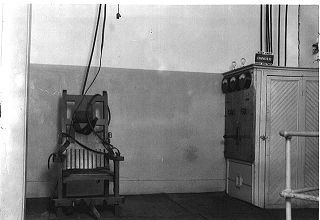
Lethal injection is the practice of injecting one or more drugs into a person for the express purpose of causing rapid death. The main application for this procedure is capital punishment, but the term may also be applied in a broader sense to include euthanasia and other forms of suicide. The drugs cause the person to become unconscious, stops their breathing, and causes a heart arrhythmia, in that order.

The electric chair is a specialized device used for capital punishment through electrocution. The condemned is strapped to a custom wooden chair and electrocuted via electrodes attached to the head and leg. Alfred P. Southwick, a Buffalo, New York dentist, conceived this execution method in 1881. It was developed over the next decade as a more humane alternative to conventional executions, particularly hanging. First used in 1890, the electric chair became symbolic of this execution method.

Execution by firing squad, in the past sometimes called fusillading, is a method of capital punishment, particularly common in the military and in times of war. Some reasons for its use are that firearms are usually readily available and a gunshot to a vital organ, such as the brain or heart, most often will kill relatively quickly.

In the United States, capital punishment is a legal penalty throughout the country at the federal level, in 27 states, and in American Samoa. It is also a legal penalty for some military offenses. Capital punishment has been abolished in 23 states and in the federal capital, Washington, D.C. It is usually applied for only the most serious crimes, such as aggravated murder. Although it is a legal penalty in 27 states, 20 of them have authority to execute death sentences, with the other 7, as well as the federal government and military, subject to moratoriums.

Capital punishment is a legal penalty in the U.S. state of Ohio, although all executions have been suspended indefinitely by Governor Mike DeWine until a replacement for lethal injection is chosen by the Ohio General Assembly. The last execution in the state was in July 2018, when Robert J. Van Hook was executed via lethal injection for murder.
Capital punishment is a legal penalty in the U.S. state of Utah.
Capital punishment is a legal penalty in the U.S. state of Nebraska. In 2015, the state legislature voted to repeal the death penalty, overriding governor Pete Ricketts' veto. However, a petition drive secured enough signatures to suspend the repeal until a public vote. In the November 2016 general election, voters rejected the repeal measure, preserving capital punishment in the state. Nebraska currently has 12 inmates on death row.
Capital punishment is a legal penalty in the U.S. state of Oklahoma.

Old Sparky is the nickname of the electric chairs in Arkansas, Connecticut, Florida, Georgia, Illinois, Kentucky, Nebraska, New York, Ohio, Oklahoma, South Carolina, Texas, Virginia, and West Virginia. Old Smokey was the nickname of the electric chairs used in New Jersey, Pennsylvania, and Tennessee. "Old Sparky" is sometimes used to refer to electric chairs in general, and not one of a specific state.

Opened in 1969, Georgia Diagnostic and Classification Prison (GDCP) is a Georgia Department of Corrections prison for men in unincorporated Butts County, Georgia, near Jackson. The prison holds the state execution chamber. The execution equipment was moved to the prison in June 1980, with the first execution in the facility occurring on December 15, 1983. The prison houses the male death row, while female death row inmates reside in Arrendale State Prison.
Capital punishment is a legal penalty in the U.S. state of Idaho.

Capital punishment is a legal penalty in the U.S. state of Mississippi.
Capital punishment is a legal penalty in the U.S. state of South Carolina. Between 1718 and 2021, more than 680 people have been executed in South Carolina. After the nationwide capital punishment ban was overturned in 1976, South Carolina has executed 43 people.
Capital punishment is a legal punishment in Tennessee.

Carey Dean Moore was a convicted murderer, executed by lethal injection by the state of Nebraska. It was the first execution in Nebraska using lethal injection, and the state's first execution since 1997. The execution was the first in the United States to use fentanyl.

Terry Melvin Sims was an American convicted murderer who was executed by the state of Florida for fatally shooting a sheriff's deputy in Longwood, Florida. He was the first Florida inmate executed with the use of lethal injection, after the previous execution, which was conducted under the electric chair, had been seriously botched.
Gilbert Ray Postelle was an American mass murderer who was sentenced to death and executed for his involvement in a quadruple murder in Oklahoma. He was executed on February 17, 2022, by lethal injection.










